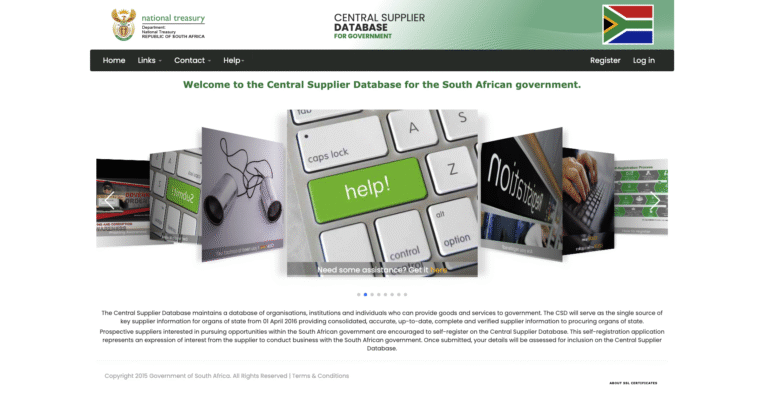Starting a tender business in South Africa can be a game-changer if you’re looking to tap into lucrative opportunities. With government and private sectors regularly seeking suppliers and contractors, tenders offer a steady stream of projects for entrepreneurs ready to deliver quality services. The process might seem complex at first, but with the right approach, you can position yourself for success.
Understanding how tenders work and knowing where to begin is key. From registering your business to meeting compliance requirements, every step plays a crucial role in establishing credibility. Whether you’re new to the business world or expanding your existing venture, navigating the tender process effectively can open doors to long-term growth and profitability.
Understanding The Tender Business In South Africa
Operating in South Africa’s tender business sector involves engaging with procurement processes where organizations solicit bids for goods, services, or projects. This procurement system supports transparency, competitiveness, and economic inclusion. Both government and private entities issue tenders, presenting opportunities across multiple industries such as construction, IT solutions, healthcare supplies, and transportation services.
Government tenders form a significant part of this market due to South Africa’s public sector focus on infrastructure development and service delivery. Examples include road construction, waste management, and educational materials. Private sector tenders, on the other hand, cater to specialized needs like corporate security services, technology upgrades, and facility management.
Compliance is fundamental in this business. You must align with regulations outlined in the Preferential Procurement Policy Framework Act (PPPFA) and meet Broad-Based Black Economic Empowerment (B-BBEE) scorecard requirements. Non-compliance limits access to government and certain private tenders.
To fully understand this business, you need to familiarize yourself with platforms like eTenders or Municipal Bid boards where official tenders are published. These platforms provide details about tender specifications, deadlines, and submission processes. Reliable access to these resources assists in identifying relevant opportunities and meeting submission expectations.
Legal Requirements And Registrations
Complying with legal requirements is essential when starting a tender business in South Africa. Proper documentation ensures credibility and eligibility to bid for government and private sector tenders.
Business Registration
Register your business with the Companies and Intellectual Property Commission (CIPC) to formalize its legal structure. Choose from options such as sole proprietorship, partnership, or private company, depending on your operational goals. Also, obtain a company registration number, which is mandatory for tender applications.
Tax Clearance Certificate
Apply for a Tax Clearance Certificate through the South African Revenue Service (SARS) to confirm your tax compliance status. This document demonstrates that your business meets all tax obligations and remains current with filings. A valid tax compliance PIN is now often required for electronic submissions.
BBBEE Certification
Secure a Broad-Based Black Economic Empowerment (BBBEE) certificate to demonstrate alignment with transformation policies. BBBEE levels significantly impact eligibility and competitiveness for certain tenders, particularly government contracts. Select an accredited verification agency for businesses above the exempted microenterprise (EME) threshold or self-assess for small enterprises within the EME limit.
Developing A Business Plan
A well-structured business plan is key when starting a tender business in South Africa. It serves as a roadmap for establishing your operations, securing funding, and meeting market needs effectively.
Identifying Your Niche
Focus on specific industries or services to enhance your competitive edge. Assess your expertise, resources, and the demands of sectors like construction, IT services, or catering. For instance, if targeting government infrastructure projects, align with areas prioritized in national development plans.
Market Analysis
Conduct thorough research to understand demand, competition, and client expectations within your chosen niche. Examine tender opportunities on platforms like eTenders and industry-specific procurement websites. Analyze market size, growth potential, and competitor bids to position yourself for success.
Financial Planning
Create a detailed financial plan to manage start-up and operational costs effectively. Account for expenses like registration fees, compliance certifications, and bid submission costs. Use projections for revenue based on secured contracts to ensure profitability. Factor in funding options, such as bank loans or grants, to support initial growth.
Finding Tender Opportunities
Identifying tender opportunities is a critical step in establishing your business within South Africa’s competitive procurement sector. Effective strategies for locating these opportunities include utilizing government portals and building a reliable network of stakeholders.
Monitoring Government Portals
Government portals serve as a primary resource for accessing tender information. Platforms like the eTender Publication Portal compile national and provincial tender invitations, providing details on submission guidelines, deadlines, and specifications. Municipal websites across South Africa also host local tenders, often focused on service delivery and infrastructure.
Regularly checking these portals ensures you stay updated on new opportunities. Filter listings based on your niche to save time. Select relevant tenders by reviewing eligibility criteria and aligning capabilities with project requirements. Subscribing to email notifications is another way to track updates without missing critical deadlines.
Networking With Key Stakeholders
Cultivating relationships with stakeholders maximizes exposure to tender opportunities. Attend procurement workshops and industry expos where government officials, procurement officers, and private-sector decision-makers often share bidding insights.
Collaborating with business chambers or professional organizations can open doors to partnerships that enhance your credentials. Leverage social media platforms like LinkedIn to connect with procurement professionals. Proactively engaging with these stakeholders keeps you informed of upcoming projects while building credibility within your industry.
Submitting A Winning Tender Proposal
Submitting a strong tender proposal increases your chances of securing lucrative contracts. Focus on preparation, clarity, and alignment with client requirements.
Preparing Documentation
Thorough documentation establishes your business credibility during the tender process. Ensure your company profile includes core information, such as your business’s legal registration certificate, Tax Clearance Certificate from SARS, and B-BBEE certificate. Include proof of technical capability, like portfolios, past project references, or performance reviews, to demonstrate reliability.
Compile financial records, including audited financial statements, to prove your capacity to handle the project’s financial requirements. Verify compliance with client-specific submission instructions, such as required formats or notarized documents, to avoid disqualification. Keep all documents updated and organized for quicker responses to future tenders.
Writing A Competitive Proposal
A well-written proposal showcases your ability to meet the client’s needs effectively. Begin with an executive summary that highlights your qualifications and understanding of the project. Use clear, concise language to outline your methodology, timelines, and deliverables while adhering to the tender’s guidelines.
Tailor your proposal by addressing evaluation criteria listed in the bid document, such as pricing, technical solutions, or innovation. Provide cost-effective yet competitive pricing supported by a detailed budget breakdown. Emphasize value-added benefits, like local employment creation or skills transfer, if they align with the client’s goals.
Proofread for errors and ensure all required sections, including appendices, are well-documented. A polished and professional presentation increases your chances of standing out among competitors.
Challenges And Tips For Success
Operating a tender business in South Africa involves navigating various challenges. Addressing these effectively is crucial to achieving success in this competitive environment.
Common Challenges
- Complex Compliance Requirements
Meeting regulatory standards, such as B-BBEE compliance and tax clearance, poses difficulties for many businesses. Misinterpretation of legal requirements can lead to disqualification.
- Fierce Competition
Competing against experienced bidders and larger enterprises creates significant hurdles, especially for smaller businesses new to the market.
- Financial Constraints
High costs associated with bid preparation, certifications, and resource allocation burden many new businesses.
- Limited Access To Opportunities
Identifying relevant tenders can be challenging without access to reliable platforms or established networks. Missing submission deadlines often results from this issue.
- Inconsistent Cash Flow
Delays in project payments can disrupt operations, especially for smaller businesses with limited financial reserves.
Strategies To Overcome Challenges
- Ensure Compliance Mastery
Research the PPPFA, B-BBEE requirements, and tax regulations thoroughly. Partner with compliance consultants if needed to ensure your documentation meets all criteria.
- Differentiate Your Business
Focus on niche markets to reduce direct competition from larger firms. Developing unique services or capabilities enhances your appeal to clients.
- Leverage Financial Planning
Prepare a detailed budget that accounts for tender-related expenses. Explore financing options like bank loans, supplier credit terms, or government grants to maintain cash flow.
- Utilize Digital Platforms
Regularly monitor platforms like the eTender Portal to stay updated on open opportunities. Set alerts and filters to align with your business strengths.
- Develop A Strong Network
Build relationships with procurement professionals, business forums, and government officials. Attend industry events to uncover unlisted opportunities and receive direct insights.
- Establish Payment Agreements
Negotiate clear payment terms and milestones within your contracts to minimize cash flow risks. Include penalties for late payments where possible to protect financial stability.
Conclusion
Starting a tender business in South Africa presents exciting opportunities for growth, provided you’re well-prepared and committed to navigating the process. By focusing on compliance, building strong networks, and crafting compelling proposals, you can position yourself for success in this competitive sector.
While challenges like financial constraints and competition may arise, strategic planning and adaptability can help you overcome them. With the right mindset and consistent effort, your tender business can thrive and contribute to South Africa’s dynamic economy.





